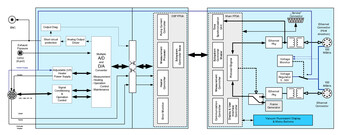Size and weight |
|
| Dimensions (H/W/D) | 72 x 128 x 174 mm / 2.8 x 5 x 6.9 in |
| Weight | 905 g / 2.0 lb (ES630), 920 g / 2.03 lb (ES635) |
| 1055 g / 2.33 lb (ES631), 1085 g / 2.39lb (ES636) | |
Environment |
|
| Temperature range | -40 °C to +70 °C (-40 °F to +158 °F) (operation) |
| -40 °C to +85 °C (-40 °F to +185 °F) (storage) | |
| Altitude | Up to 5.000 m / 16,400 ft |
| Tested for | Mechanical shock, vibration, fall, temperature shock, temperature alteration according to DIN EN 60068 res. ISO 16750 |
Power supply module |
|
| Operating voltage | 6 V to 50 V DC |
| Power consumption (at 13.5 V DC) | 6.5 W typ. (ES630/ES635) |
| 7.5 W typ. (ES631/ES636) | |
Power supply sensor heater |
|
| Operating voltage | 9 V to 28 V DC |
| Power consumption (at 13.5 V DC) | 9 W typ. (one LSU 4.9 sensor exposed to air, ES630/ES635) 18 W typ. (two LSU 4.9 sensors exposed to air, ES631/ES636) |
Sensor interface |
|
| Channels | 1 (ES630/ES635) / 2 (ES631/ES636), including control and supply of sensor heater |
| Supported lambda oxygen sensors | Bosch LSU 4.2, LSU 4.7, LSU 4.9, LSU 5.1, LSU ADV-G, and NTK ZFAS®-U2 |
| Sensor connection | The different oxygen sensors are connected by different adapter cables to the ES63x modules. The sensor type is coded in the adapter cable or the sensors of type LSU ADV and LSU 5.1 delivered by ETAS. The sensor type will be automatically detected by the modules. |
| Measurement signals and ranges[1] | Lambda λ: 0.6 to 16 |
| 1/λ: 1.67 to 0.0625 | |
| Air-fuel ratio A/F: 8.5 to 200 | |
| Fuel-air ratio F/A: 0.005 to 0.118 | |
| Oxygen content O2: 0 % to 25 % | |
| Pump current Ip of the λ sensor: -10 mA to 10 mA | |
| Ambient pressure Pamb: 600 hPa to 1150 hPa | |
| External pressure sensor Pext (ES635/ES636): 500 hPa to 3000 hPa | |
| Measurement sampling rates | 0.5 Samples/s to 2 kSamples/s |
| Pamb: 1 Sample/s | |
| Monitoring signals and ranges | Internal resistance of the Lambda sensor Ri: 0 Ohm to 2000 Ohm[1] |
| Temperature of sensor ceramic Tcer: 500°C to 1000°C | |
| Monitoring sampling rates | 0.5 – 20 Samples/s |
Oxygen sensor supply and control |
|
| Sensor heater supply and control |
Configurable for each channel, possible to keep sensor at operational temperature also when module is off |
| Heater supply | 0 V to 18 V / typ. 5 A |
| Heatup curve | Output voltage configurable in equidistant steps by use of a csv-file. Width of the steps is a multiple of 50 ms. Maximum step width: 500 ms |
| Pump current controller | Programmable for adaptation on future sensors |
Display |
|
| Type | Dot matrix vacuum fluorescence display (128 x 64 pixels) |
| Layout | Display of 2 signals plus status message |
| Keyboard | On front panel, 6 keys: 4 x softkey, 1 x forward, 1 x backward |
Analog output |
|
| Channels | 1 (ES630/ES635) / 2 (ES631/ES636), electrically isolated |
| Output voltage | 0 V to 10 V |
| Output signal | λ, 1/λ, A/F, F/A, O2, Ip, Pamb, Ri, or Tcer, configurable by software |
| Output impedance | Virtually 0 Ohm, short circuit protected and protected against external voltages of up to 28 V |
| Output current | max. 10 mA |
Host interface |
|
| Ethernet | 100 Mbit/s Base-T Ethernet, Full-Duplex required, XCP-on-UDP/IP protocol, for each input channel measurement signals of different type can be provided concurrently to host system |
| IP address | Dynamic via INCA or configuration tool (default 192.168.40.44) |
| RS-232, SMB protocol | 38400 bit/s, 8 bits in parity, 1 stop bit |
Support by ETAS Software |
|
| Supported by INCA V6.2.1 (ES63x) / INCA V7.1 (ES63x with LSU 5.1 probe) and up by add-on (part of the ES63x delivery), INTECRIO V4.0 (ES63x) and up, ASCET-RP V6.1.3 (ES63x ) and up, HSP V10.5 (support of the LSU 5.1 probe by ES63x) and up, ES63x configuration and integration tool for XCP applications, universal driver for integration into third-party software applications without XCP interface (V1.5.0 and up) |
|
Compatible ETAS compact hardware modules |
|
| Prototyping and Interface Module ES910, Network and Interface Modules ES51x and ES59x, Network Module ES600, Micro Measurement Modules ES4xx | |
Notes |
|
| [1] | Minimum values, actual values depend on the characteristic curve of the individual lambda oxygen sensor. |
This product has been developed and released for use in automotive applications. For usage in other domains please contact your ETAS representative.
